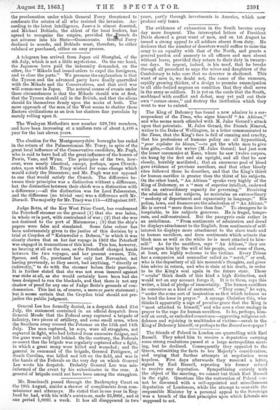The King of Dahomey has found a new admirer in
a cor- respondent of the Times' who signs himself "An African," and who seems much offended with M. Jules Gerard's attack upon that potentate. M. Jules Gerard, the French Nimrod, writes to the Duke of Wellington, in a letter communicated to the Times, that the King's face is full of cunning and cruelty, that his professions of humane policy are all hypocritical, "pour exploiter lee blanes,"—to get the white men to give him gifts,—that the writer (M. Jules Gerard) had just seen the lesser ceremonies at Kana, where he saw twelve corpses, six hung by the feet and six upright, and all that he saw closely, horribly mutilated ; that an enormous pool of blood gave evidence of previous sacrifices, and that other bloody rites followed those he describes, and that the King's thirst for human sacrifice is greater than the thirst of his subjects. On the other hand, "Au African" speaks very highly of the King of Dahomey, as a "man of superior intellect, endowed with an extraordinary capacity for governing." Receiving the adulation of his subjects, he maintains an extraordinary "modesty of deportment and equanimity in language." His police, laws, and finances are the admiration of "An African." He is served "more from love than fear." To strangers he is hospitable, to his subjects generous. He is frugal, tempe- rate, and self-restrained. But the panegyric ends rather in an anticlimax. "From sentiments of admiration and dread he displays attachment to the English, from sentiments of self- interest he displays more attachment to the slave trade and to human sacrifices, and from sentiments which actuate the black man as well as the white he is most attached to him- self." As for the sacrifices, says "An African," they are forced upon him by the will of his people, and some of them, at least, are highly welcome to the victims. Every Prince has a companion and counsellor called an " ocrah," or soul, who is the depositary of all his monarch's thoughts, and gives him advice in return, and who is slain at his death, in order to be the King's soul again in the future state. These " °crabs" think death of this kind a high distinction, and would not on any account forego it. It is to them, says this writer, a kind of pledge of immortality. The human sacrifices he conceives as a kind of sacrament. "They come," he says, "under the same sort of inspiration as that which induces us to bend the knee in prayer." A strange Christian this who thinks it apparently a sign of peculiar grace that the ling is "most attached to himself," and who sees a close analogy in prayer to the rage for human sacrifices. Is he, perhaps, him- self an ocrah, or embodied conscience—approving religious sel- fishness and rejoicing in multitudes of victims—ocrah to the King of Dahomey himself, or perhaps to the Record newspaper?






























 Previous page
Previous page